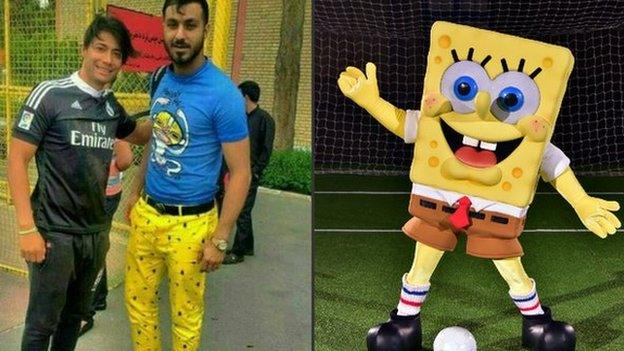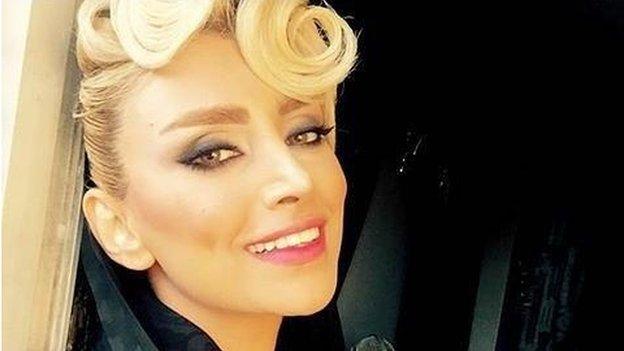Why 'SpongeBob' trousers furore is troubling Iran
- Published

Iranian media likened Makani's trousers to SpongeBob SquarePants
The story of an Iranian goalkeeper suspended for, reportedly, wearing trousers with a motif similar to the cartoon character SpongeBob SquarePants raised eyebrows around the world - but the case highlights some of the tensions at play in the country.
According to a committee in charge of policing the morality of Iran's football federation, Sosha Makani's outfit was deemed inappropriate and against Islamic values.
However, committee chief Mahboub Afrasiabi said it was only rumours that Makani was suspended because of the style of his trousers and that the matter would be dealt with after Ramadan.
The issue of Makani's "SpongeBob SquarePants" comes at a time when social media users in Iran have been voicing anger at what they see as the systematic targeting of public figures by the conservative establishment.
In an apparent attempt to calm the atmosphere, Sadra Mohaqeq, an editor at reformist newspaper Shargh Daily, tweeted: "The extent of reaction and the government's dealing with an incident, such as Sosha's trousers… is a direct result of its coverage across social media platforms."
However in a sign of the strength of feeling, another Twitter user took issue, responding with: "What kind of analysis is this? You mean to say people should not oppose anything? That we no longer have the right to oppose anything? That we shouldn't even voice an opinion?"
'Western promiscuity'
The public furore around the Makani case has caused a stir among the authorities who fear it could put the cultural integrity of the country in jeopardy.
Observers have suggested that to the government, Makani's trousers represent a step towards individuals straying from conservative religious teachings of the clergy and how Islam should govern their daily lives.
The goalkeeper's attire is only the latest example of personal expressions to have fallen foul of the establishment.

Elham Arab was arrested in a crackdown on 'immodest' dress
Recently, Taraneh Alidoosti, a celebrated actress who displayed a feminist tattoo on her left arm, drew the ire of hardliners who called for her to be banned from the screens.
That too followed the arrest of seven Iranian fashion models, who were charged with "promoting Western promiscuity". Six of them who were women had posted pictures of themselves without headscarves on Instagram.
In a televised trial, one of the models, Elham Arab, emphasised that fame and beauty were universal desires but acknowledged there was a "price to be paid".
The models were arrested as part of an ongoing operation against "loose hijab" - code for immodest dress.
The head of Iran's cyber-crimes court said the campaign had been stepped up to "monitor the use of social media by the Western imperialist powers to change the Iranian-Islamic life-style of our nation".
'Inevitable harassment'
While on the face of it, the government's concern with a man's choice of trousers might appear an overreaction, in the bigger picture it can be seen as an attempt to perpetuate a policy imposed since the Islamic revolution of 1979.
This was echoed by an Iranian Twitter user, Bahareh, who pointed out that women have been subjected to scrutiny for years.
"Your silence for when they condemn girls for their hijab should prepare you for their inevitable harassment when it comes to the colour of men's trousers," she tweeted.
The Iranian government has even gone as far as accusing US celebrity Kim Kardashian and the CEO of Instagram of using "un-Islamic" methods aimed at corrupting Iranian youth.
The disconnect between the authorities and ordinary people over Makani's ban was summed up by respected Iranian sports reporter Pejman Rahbar.
"The six-month ban has been issued by an institute called an 'Ethics Committee', a place that reminds one of an illusionary Utopia, governed by a fake mayor," he posted on Facebook.
"Their views are reflected in their ruling; an institute that we are powerless to confront whilst Iranian footballs roll like little marbles in the hands of a few on top."